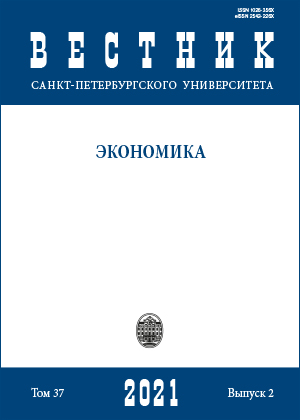Анализ измерений I-DESI развития цифровой экономики в Российской Федерации и ЕС-28 с использованием многомерной статистики
DOI:
https://doi.org/10.21638/spbu05.2021.201Аннотация
Авторы статьи продолжают предыдущую работу. В предыдущей работе, используя пять основных параметров Международного индекса цифровой экономики и социального развития (I-DESI) 28 стран ЕС и Российской Федерации, мы рассмотрели, как развитие России соотносится с развитием других стран ЕС. Целью данной статьи является не ранжирование, а определение взаимосвязи между каждым параметром и группами, на которые можно разделить 29 исследованных стран с помощью инструментов многомерного статистического анализа, а также анализ группы, к которой принадлежит Российская Федерация. Мы используем анализ главных компонентов (Principal Component Analysis, PCA) для сопоставления наших данных с пространством более низкого измерения (выявляя два скрытых измерения) и анализируем причинно-следственные связи между основными измерениями с использованием частных коэффициентов корреляции, делая вывод, что два из пяти основных измерений можно объяснить тремя независимыми измерениями. После этого мы используем кластерный анализ, чтобы сгруппировать наши объекты (т. е. 29 стран) в кластеры, и многомерное масштабирование (multidimensional scaling, MDS), чтобы визуализировать расположе- ние этих групп и стран на плоскости двух компонентов (PCA), акцентируя внимание на Российской Федерации. По нашим результатам Российская Федерация может быть отнесена к умеренно развитой стране по показателю I-DESI, но ее положение в плоскости основных компонентов отличается от группы умеренно развитых стран ЕС, образующих отдельную «группу», во многом благодаря уникальным особенностям цифрового развития страны.
Ключевые слова:
измерение цифровой трансформации, индекс DESI, анализ главных компонент, частичный корреляционный анализ, кластерный анализ, многомерное масштабирование.
Скачивания
Библиографические ссылки
References
Akberdina V. V. (2018) Digitalization of industrial markets: Regional characteristics. Upravlenets (The Manager), no. 6, pp. 78–87.
Banhidi Z., Dobos I., Nemeslaki A. (2019) Comparative Analysis of the Development of the Digital Economy in Russia and EU Measured with DEA and Using Dimensions of DESI. St Petersburg University Journal of Economic Studies, no. 4, pp. 588–604.
Banhidi Z., Dobos I., Nemeslaki A. (2020) What the overall Digital Economy and Society Index reveals: A statistical analysis of the DESI EU28 dimensions. Regional Statistics, no. 2, pp. 42–62.
Baskakova M., Soboleva I. (2019) New Dimensions of Functional Illiteracy in the Digital Economy. Voprosy obrazovaniya (Educational Studies Moscow), no. 1, pp. 244–263.
Ermolaev K. N., Trubetskaya O. V., Shnyakin K. V., Pavlova J. A. (2019) Platforms and tendencies for the development of the digital economy in Russia. SHS Web of Conferences, vol. 62. https://doi.org/10.1051/shsconf/20196201001
Korovin G. B. (2018) Problems of Industrial Digitalisation in Russia. Journal of New Economy. Ural State University of Economics, no. 3, pp. 100–110.
Kuvayeva Yu. V. (2019) Digital economy: Concepts and Russia’s readiness to transition. Journal of New Economy. Ural State University of Economics, no. 1, pp. 25 40.
Miethlich B., Belotserkovich D., Abasova S., Zatsarinnaya E., Veselitsky O. (2020) Digital economy and its influence on competitiveness of countries and regions. Revista ESPACIOS, no. 12, pp. 20–31.
Mironova O. A., Bogdanova R. M., Kolesnikov Yu. A. (2019) Aspects of the generational theory application in terms of digital education development in Russia. Media Education (Mediaobrazovanie), no. 1, pp. 93–104.
Moroz M. (2017) The Level of Development of the Digital Economy in Poland and Selected European Countries: A Comparative Analysis. Foundations of Management, no. 1, pp. 175–90.
Pearl J. (2009) Causality. Cambridge University Press, Cambridge. 484 p.
Revinova S., Lazanyuk I. (2018) Prerequisites for Development of the Digital Economy in Russia: Differentiation of Regions. International Journal of Business and Management Studies, no. 2, pp. 607–617.
Stavytskyy A., Kharlamova A., Stoica E. A. (2019) The analysis of the digital economy and society index in the EU. Baltic Journal of European Studies, no. 3, pp. 245 261.
Vishnevsky V. P. (2019) The Digital Economy in the Context of the Fourth Industrial Revolution: Opportunities and Limitations.St Petersburg University Journal of Economic Studies, no. 4, pp. 606–627. (In Russian)
Загрузки
Опубликован
Как цитировать
Выпуск
Раздел
Лицензия
Статьи журнала «Вестник Санкт-Петербургского университета. Экономика» находятся в открытом доступе и распространяются в соответствии с условиями Лицензионного Договора с Санкт-Петербургским государственным университетом, который бесплатно предоставляет авторам неограниченное распространение и самостоятельное архивирование.






